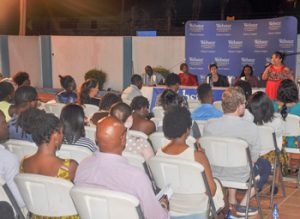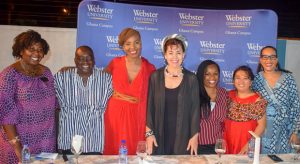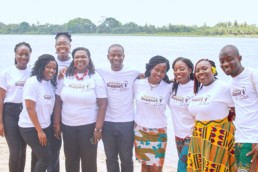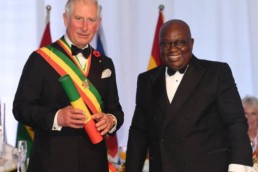In 2006, Tarana Burke started the Me Too campaign to give sexual abuse survivors a voice. The campaign became a movement when actress Alyssa Milano prompted women to tweet #MeToo to illustrate the magnitude of sexual harassment. Since, the movement has gained incredible feedback in the U.S. and internationally among women. Their collective voice resulted in the indictment of sexual offenders like Hollywood exec Harry Weinstein, whose arrest was a symbolic victory for the #MeToo movement. With sexual harassment being a pervasive threat in Ghanaian society, the question then becomes would the #MeToo movement have positive impact in Africa? Would it work in Ghana, to be exact?
On 19th April, 2018,Webster University tackled the topic by hosting an evening public lecture titled “Breaking the Silence: An African Perspective on #MeToo.” The lecture took the format of a panel discussion, which transitioned into an interactive session with questions from the audience. The panelists included journalist and Webster University faculty member Esther Armah; Chair of Diplomacy at University of Johannesburg, Dr. Yolanda Spies; psychologist and nutritionist, Dr. Funke Baffour and research fellow at the University of Cape Coast, Dr. Mike Boakye-Yiadom. Each panelist gave a short presentation.
Dr. Funke Baffour shared that every 26 seconds a woman in Africa is raped and unpacked how the culture of silence enables and perpetuates the cycle of sexual harassment. “These statistics are only ten years old. How many people have the voice? We are living on a continent where your voices are not allowed to be heard. The voices of women are not heard because if you talk you won’t get married, be a good wife, be good women and you will be accused of bringing shame to the family,” professed Dr. Baffour.
 Dr. Mike Boakye-Yiadom cautioned the fight against sexual abuse must not be left for women alone. Men need to be a part of the effort in order to achieve change. “Some men have sisters, some have spouses, so if it’s about women, it’s also about men. Most victims are hesitant to report and many who report, prefer to speak with family and friends instead of law enforcement agencies. After almost twenty decades this hasn’t changed. There are some aspects of Ghanaian culture that make it difficult for victims to report. Almost every university and all the colleges of education in Ghana have sexual harassment policies which must be implemented,” shared Dr. Boakye-Yiadom.
Dr. Mike Boakye-Yiadom cautioned the fight against sexual abuse must not be left for women alone. Men need to be a part of the effort in order to achieve change. “Some men have sisters, some have spouses, so if it’s about women, it’s also about men. Most victims are hesitant to report and many who report, prefer to speak with family and friends instead of law enforcement agencies. After almost twenty decades this hasn’t changed. There are some aspects of Ghanaian culture that make it difficult for victims to report. Almost every university and all the colleges of education in Ghana have sexual harassment policies which must be implemented,” shared Dr. Boakye-Yiadom.
According to the Domestic Violence and Victim Support Unit of the Ghana Police service, from 2011 to 2016 there were 30,408 cases of assault reported, with the majority of them being rape cases (reported by women). This number only reflects individuals who reported, leaving out the many silenced by fear, shame and ignorance of the law. In addition to the culture of letting things slide, it is important to understand how the media and various mediums play a part in shaping the narrative of sexual harassment in Ghana.
Journalist and activist Esther Armah unpacked the difference between telling a story and framing said story. She called on media professionals to be cautious of how they frame stories as the media can have immense power on people’s perceptions. “What manifests in the media is the notion that women and girls are responsible for the sexual feelings of men. If a man is aroused, it means a woman caused it, and that is the narrative that permeates,” shared the journalist and podcast host of The Spin. Armah recently lead The Safe Space, a conference on Sexual Assault & Violence Awareness at the British Council on 16 June, 2018.
Dr. Yolanda Spies expressed that the entire continent needs to join the fight against sexual harassment and shared feedback on how the issue spans across industries and specifically internally in public institutions. The event was attended by faculty, students, activist organizations and community members.
Written by Lakeshia Marie





